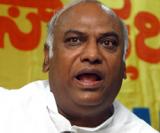
New Delhi, December 18: Lok Sabha today cleared a Constitution amendment bill that will grant special status to six backward districts in the Hyderabad-Karnataka region, with provision for reservation in education and jobs for locals.
The Constitution (118th Amendment) Bill, 2012 to insert a new Article 371-J to provide special recognition for the six backward districts of North Karnataka -- Gulbarga, Yadgir, Raichur, Bidar, Koppal and Bellary -- was passed unanimously.
The Bill was passed with overwhelming majority as all members present voted in favour. Labour Minister Mallikarjun Kharge, who is from Karnataka, said the Bill would usher in development in the region.
The bill provides for establishment of a separate Development Board and equitable allocation of funds for development of the region. Besides, it would provide quota in public employment through constitution of local cadres and reservation in education and vocational training institutions for those who belong to the region by birth or by domicile.
The demand for a special status has been long pending. The Karnataka Assembly and Legislative Council had passed resolutions in 2010 for making special provisions for this area.
Opposition parties welcomed the bill and some MPs also sought special status for developing backward regions in many other states including Uttar Pradesh, Bihar and Odisha.
Former Prime Minister H D Deve Gowda, who hails from Karnataka, complimented the UPA government for taking up the bill and said the issue has been pending for the "last 40 years".
Former Karnataka Chief Minister, Dharam Singh (Cong) said passing of the bill would be "the beginning of a new era". "It is a historic day for Karnataka... This (Bill) will give long lasting justice to people of Karnataka and Hyderabad," Ananth Kumar (BJP), who belongs to Karnataka, said.
Government should ensure that justice is done to the people of the region after 56 long years, he said. Shailendra Kumar (SP) urged the government to provide similar recognition for backward regions in Uttar Pradesh, including Bundelkhand.
"(Backward regions) in Uttar Pradesh should also be given special status," he said. Tathagata Satpathy (BJD) appealed to the government to confer special status on backward regions in Odisha.
Odisha, Bihar, West Bengal and Jharkhand, are among the states that have "sacrificed immensely" for the development of the country, he noted.
"An acknowledgement is overdue and Odisha requires special recognition... Hope the UPA government is sensible (on the issue)," he said.
Complimenting the government for bringing the bill, JD-U chief Sharad Yadav said other backward regions in the country should also be given attention. Any area that is not developed does not contribute to the development of the nation, he said.
Saugata Roy (TMC) called upon the government to provide adequate funds for the Gorkhaland Territorial Administration (GTA) which would help in the development of that region. He also welcomed government efforts to bring development to the backward regions in the country.
Asaduddin Owaisi (AIMIM), elected from Hyderabad, said the central government should ensure that provisions of the bill are properly implemented by respective states. Such a bill should also give benefit to the people of Hyderabad, he said.





Comments
Add new comment